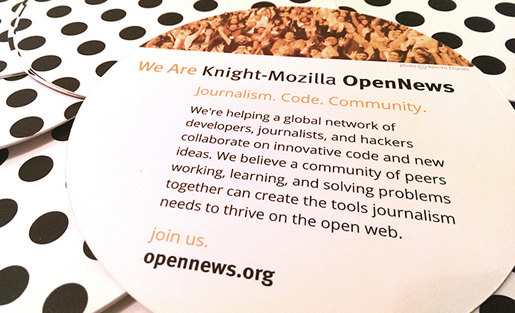In less than a month, on August 16, the search for our 2015 Knight-Mozilla Fellows will come to a close. Knight-Mozilla Fellows do amazing work — they spend 10 months embedded in newsrooms writing code to help solve journalistic problems — but they don’t do that work alone. When you become a Knight-Mozilla Fellow, you join two communities: a community of fellows (both your peers and alumni from the program), and a community of developers working in the newsroom.
To mark this final month of our 2015 Fellowship search, we’ve invited many voices to talk about their experiences coding in the newsroom. Later in the month you’ll hear from our fellows (both current and past) and our news partners, as well. But this week we’re going to hear from the community of developers currently doing this work in newsrooms big and small around the world.
The developer community in journalism is a dynamic one, and there isn’t one single reason anyone decides to start coding in a newsroom instead of a startup or in the enterprise. Instead, developers start coding in newsrooms for all sorts of reasons.
This week (as we’ve done in the past), we’ve asked developers to share their reasons and experiences with you. These stories — we’ll share a few a day — are wonderful, each one a unique argument to join a singular community.
why develop in the newsroom?
For Jeremy Bowers, a developer at the New York Times, journalism offers something different from traditional coding jobs. He explains:
We’ve got soul.
We’ve got a mission.
We’re self-critical.
We’ve got stacks of interesting structured data aching to be investigated and summarized. Our reporters are staring down the federal government, tracking people who are otherwise invisible and watching the epidemics most people don’t even know about.
Aaron Williams, who codes at the Center for Investigative Reporting, echoes Bowers when he says that in traditional programming, “It’s not often the code you write influences the politics of the community.” But, Williams also adds:
I develop in a newsroom because, honestly, it’s just plain fun.
On any given day you may have to write a web crawler to harvest crime logs from your local law enforcement agency or use Mechanical Turk to crowdsource analysis of PDFs you received from a public records request.
On other days you’ll need a better map than Google offers and end up making creating your own slippy map tile set. Or you may start picking up libraries like pandas and SPSS to do some serious data analysis on a 25 GB data dump you’re trying to clean in another Terminal window.
Needless to say, you’ll stay busy and you’ll become a better developer than you ever thought.
Have fun and change the world while you do it: Become a 2015 Knight-Mozilla Fellow by applying today.
PS. if you’re a developer in the newsroom and want to contribute your voice to this collection as well, just let me know.
Dan Sinker heads up the Knight-Mozilla News Technology Partnership for Mozilla. From 2008 to 2011 he taught in the journalism department at Columbia College Chicago, where he focused on entrepreneurial journalism and the mobile web. He is the author of the popular @MayorEmanuel twitter account and is the creator of the election tracker the Chicago Mayoral Scorecard, the mobile storytelling project CellStories, and was the founding editor of the influential underground culture magazine Punk Planet until its closure in 2007. He is the editor of We Owe You Nothing: Punk Planet, the collected interviews and was a 2007-08 Knight Fellow at Stanford University.
A version of this post originally appeared on DanSinker.com.




I’m no coder and probably never will be (an aptitude, not an attitude, issue), but I am interested in bringing coders and newsrooms together; that was the basis of my Knight Stanford and Foundry proposals. What I’m not seeing is discussion about how to archive reusable code, as modularly as possible. The problem my research found — too many under-resourced newsrooms having to reinvent the wheel — doesn’t seem to be addressed by this otherwise great program, where coders drop in, do custom solutions, and move on. It’s a bit like building a word processor from scratch for each news story.